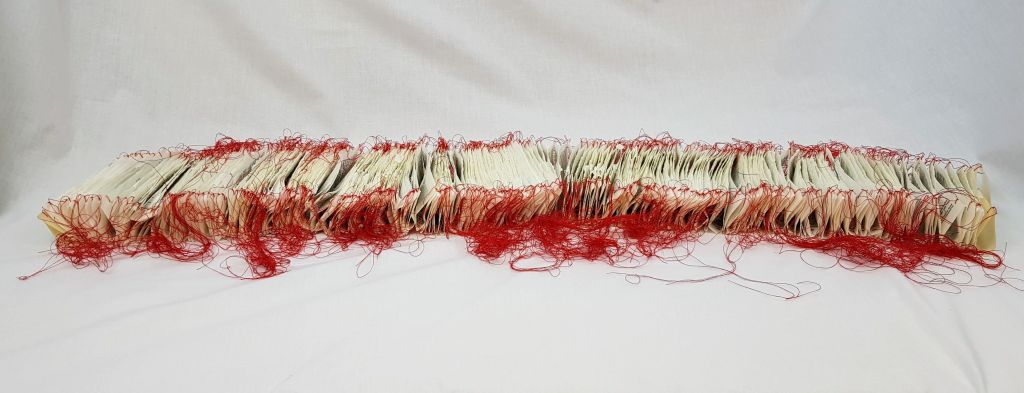
The process of looking at art is not only a rational activity of the mind. Looking at images arouses deeper feelings and perceptions. Images sometimes get under our skin and seem to touch the life of our body, through memory, awareness, and desire. Images touch us, they want to be cradled, felt, and held against our fingers so we can feel their texture and physicality. There is a strong connection between seeing and touch. This haptic sense of touch links our fingertips and our eyes, when we describe sensations that arouse or invite our devotion, prayer, admiration, as well as provoke anxiety, horror, or even anger. Images touch us in ways that activate our tactile memory, reminding us that seeing is not just an abstract mental activity but one that resides in our existence as creatures with skins that record memory and anticipate hope.
This vocabulary of touch is clearly at work in the creation and the visual form of the work A Shorter Morning and Evening Prayer by Australian artist Karly Michelle Edgar. The work pictured here has been laid out on the white cloth of a communion table in a church. It has been created through the folding of pages from a small book of daily prayer. Each page has been folded in the same way through repetition, covered in wax, and then sewn together with bright red thread. As a viewer, we not only see but also feel the tactile process of making, with each gesture of folding, dipping, and sewing. Over and over again this work is formed through repeated gestures that remind us of the words on the pages of this prayer book, as it is turned by hand and the words on the page become breath across the reader’s lips. The repeated ritual of prayer becomes the fragile structures of wax pages curled to contain the uncontainable, the devotion, hope, and desire of the one who prays.

Karly Michelle Edgar suffers from fibromyalgia, a condition that has heightened her awareness of her own peripheral senses. She writes: ‘My life requires conscious management to survive and this has led me to a deep appreciation of ritual. Symbolic actions and rituals do not create sacred spaces but rather desire that our attention be directed towards the fact that we already live within one’. Through an artistic process, the artist has found a way of making art as well as expressing her spirituality as a ritual that supports the life of her own body. Her art-making has been a means of deeply engaging her own sense of embodiment as a place where she encounters the presence of God. In looking at this work, we see not only an object but a record of an activity over time. It is the record of a ritual that contains life in a form, conveying a sense of grace and support. Each page remains open, set in wax. It is a reminder of the way each prayer and turning of the page is like a container that holds time, a cup containing grace, giving all the time that is needed to take a full breath of life.

Having seen this work as it was situated on the communion or Eucharistic table, the aspect that remained in my memory was the random patterns made by the scarlet red cotton threads that edge each section and form the work into one long sinuous form. These vibrant fine lines reminded me of the capillary tubes that pump blood in and around our bodies, always pulsing to the rhythm of breathing and heart movement. This work activates such memories of human bodies here at the place where the body of Christ is remembered through Eucharistic practices. This work does not point to God being found in transcendence through an escape from the body to another realm. In contrast, this work invites viewers to find God in the life of their own body, in a gesture that is as close as their next breath. This work is therefore confronting in its intimate and incarnational nature. It is in our flesh, with all its unique particularity, that we might find the place where we will see God.
[A version of this piece appeared in Artway.]
℘℘℘℘
Thankyou for this. As a pastor formerly in a structured religious context I have moved into the arts having attempted an introduction of the arts in a more free flowing form into the church worship context. Well that went well didn’t it but it let me take the path less travelled. Similar to this one. Peter Breen
Thank you of this thoughtful contemplation. There is much to give mind to.